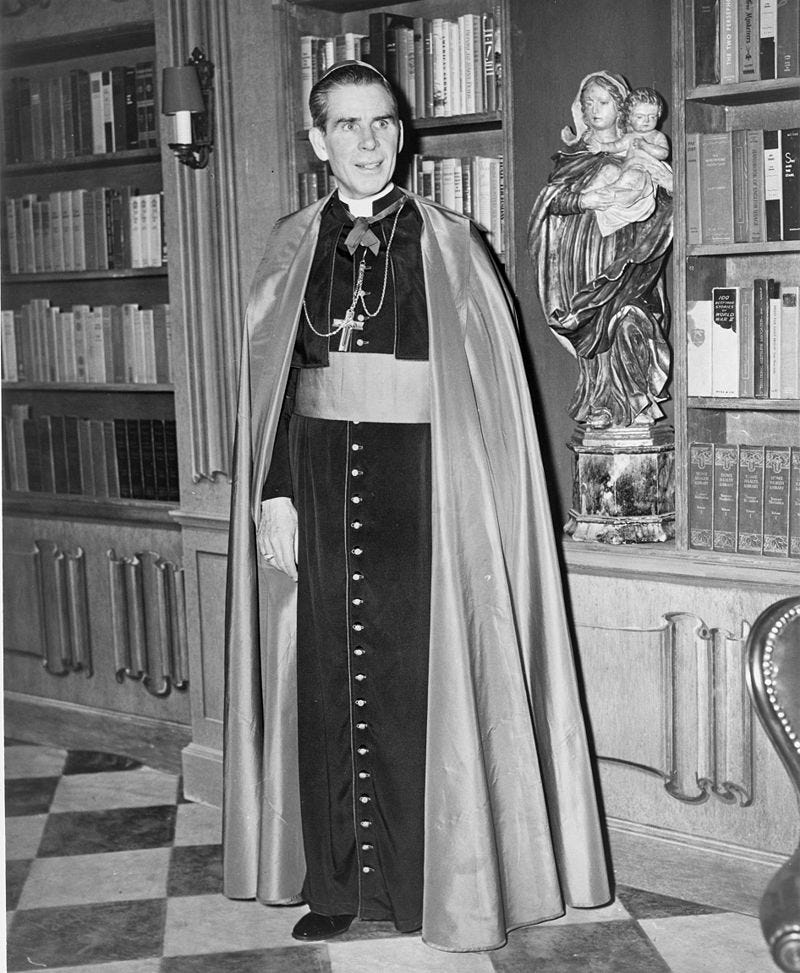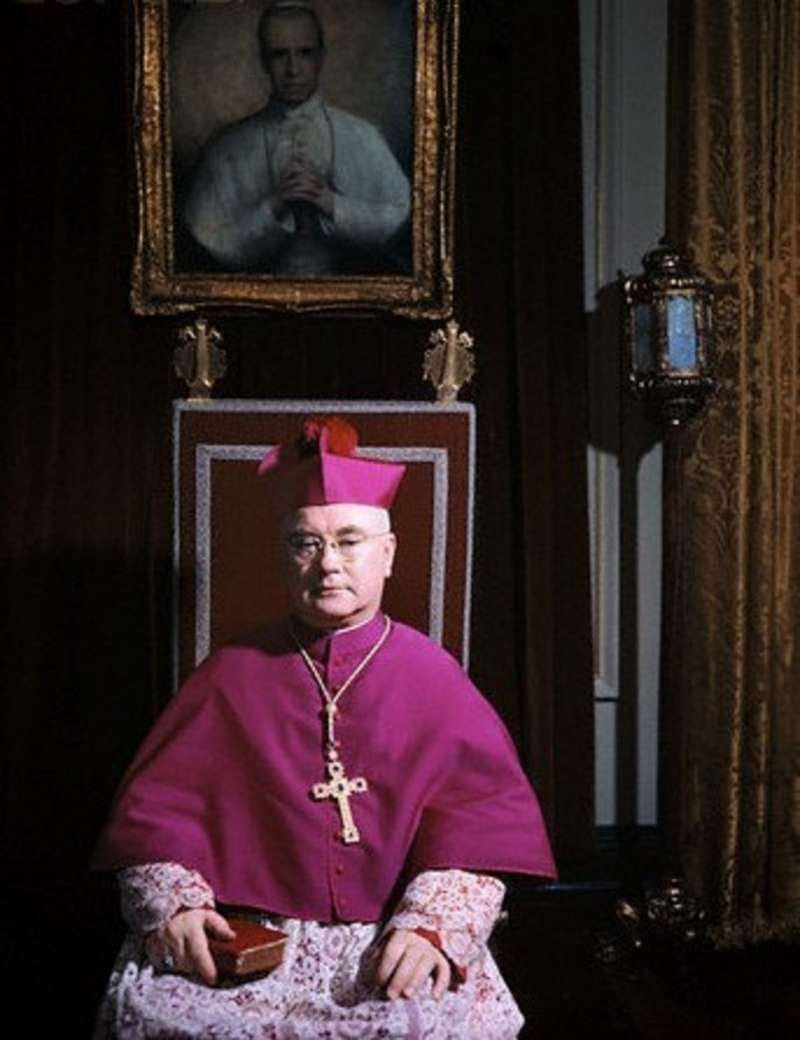Slowly making headway. The hard part is slogging on every day. The antidote for which seems to be locating my voice, which slots me into a fast lane and just allows me to step on the gas. But getting there is easier said then done.
What I’m publishing below is a portion of Chapter Three, which concerns itself with various “meanings” of the term “mean” in the 1950s, including the “arithmetic mean” (to be average), to “mean something” (to have intent), and to behave in a “mean” fashion toward others (to willfully belittle or harm another).
With Joseph McCarthy’s televised downfall in the summer of 1954, America became slightly less mean in the latter portion of the 1950s. Between 1952 and 1957, the remarkable popularity of Bishop Fulton Sheen’s weekly television show, Life is Worth Living, helped to usher American Catholicism into the cultural mainstream of the nation.
Fulton Sheen, born in 1895 and ordained into the priesthood in 1919, earned renown before World War II as a professor of theology and philosophy at Catholic University and an apostle of Thomist Natural Law. In 1951, he was named an auxiliary bishop of the Archdiocese of New York, serving – in an often-disputatious relationship – the formidable Cardinal Francis Spellman until his reassignment as the Bishop of Rochester in 1966 (constituting an exile to Siberia for the urbane priest).
A complex figure – deeply learned but also telegenically charismatic – Sheen is remembered as a pioneer of religious broadcast media and a pathbreaking televangelist. Between 1930 and 1950, he hosted the night-time radio program The Catholic Hour on NBC, where with a beguiling manner characterized by energy, wit, humor, and dramatic flair he spoke on intellectually stimulating and emotionally resonant topics concerning the spiritual lives of his listeners. In this, Sheen distinguished himself from the equally popular – but far more menacing – right-wing political preacher, Father Coughlin.
Between 1952 and 1968, Bishop Sheen moved in front of the television camera as the live host of two programs, Life is Worth Living and The Fulton Sheen Program, for which he received two Emmy Awards as Most Outstanding Television personality. You can continue to enjoy Bishop Sheen’s programs, and his incredibly corny sense of humor, on YouTube.[i]
Bishop Sheen died in 1979 and in May 2025 the Bishop of Peoria, bishop, Louis Tylka, said he would urge newly-elected Pope Leo XIV to finalize Sheen’s beatification, based on the bishop’s reputed intercession from beyond the grave to save the life of a baby born in 2010 with no vital signs, an answer to the prayers of the baby’s parents.[ii]
A doctrinally conservative Catholic and for decades a staunch anti-Communist – Fulton Sheen was perhaps less benign than he might have seemed.[iii] The emergence of Catholicism into the American mainstream heralded by Life is Worth Living masked the arrival with it of more sinister impulses long coursing through the darker recesses of the Catholic imagination.
In one episode entitled “Communism in America,” Bishop Sheen echoes Joseph McCarthy [or perhaps they are both echoing something deeper] when he tells his audience that “Communism is the scavenger of decaying civilizations [emerging from the darkest part of civilization and from what is putrid and foul in our thinking]. It makes its way into culture and country only when that culture begins to rot from the inside out. America will never be conquered from the outside, but from within.”
In another episode titled “Temptations”, we learn from Bishop Sheen about the three stages of temptation: Suggestion, Delight, and Consent. He “reassures” us that it is normal to have sexual desires, as long as one doesn’t act on them. Conditioning and strengthening ourselves to “bring the body and mind together to serve the soul” – in other words, to align ourselves in good natural law fashion with morality and virtue is the only way to control these and safely cage these urges. Repression is good! In whatever form it takes.
In a third television sermon called “False Compassion,” Bishop Sheen famously – and quite hilariously – goes medieval on the liberal softies of that era. "There are sob sisters,” he inveighs, “the social slobberers who +insist on compassion being shown to the muggers, to the dope fiends, to the throat slashers, to the beatniks, to the prostitutes, to the homosexuals, to the punks, so that today the decent man is practically off the reservation."
Sheen subsequently backs off, saying that he only means it’s important to "hate the sin ... and love the sinner." But it’s doubtful anyone takes that admonition very seriously. What’s the fun in that? It’s all about loving the sin and hating the sinner! This moral frame imbued all of Sheen’s philosophical writings and educational broadcasts, in which he warned of a civilization “based for the most part in successive negations of the Christian philosophy of life.”[iv]
It must be acknowledged, however, and it matters, that Sheen was also critical of the excesses of McCarthyism and, later, of the Vietnam War, while throughout his life speaking out against anti-Semitism and racial inequality, and promoting a version of “Americanism” that served as a model for church-state relations integral to a Judeo-Christian alliance against totalitarianism and secularism.
Fulton Sheen channeled Pope Leo XIII’s subtle efforts to navigate the turbulent currents of the modern age while remaining true to the Church’s spiritual mission and teachings. He flexibly accommodated his views to pressing matters of the day. In this manner, Sheen represented and articulated a modern vision of the Church fully aligned with the carefully reforming spirit of Vatican II.
Cardinal Francis Spellman, by contrast, was an entirely gothic medieval figure, a politically cunning and duplicitous servant of its earthly mission and will to power. Fully enmeshed within the institutional and transactional networks of his church and his city, a man without a trace of interest in the life of the mind, Spellman’s doctrinal emissions were merely sterile and pro forma nods to the letter but not the life of the natural law.
Spellman served as the Archbishop of New York for 28 years, from 1939 until his death in 1967. He was a man of stone and secrets, harboring darkly repressed passions that evoke some combination of the brooding, sexually inflamed Archdeacon Claude Frollo in The Hunchback of Notre Dame and New York City’s master builder, Robert Moses, Spellman’s co-conspirator in the massive reconstruction of New York’s civil and ecclesiastical spaces in the middle third of the 20th century.
During the Lavender Scare, Spellman leveraged anti-communist and anti-gay rhetoric to consolidate the institutional and clerical authority of the Church as a moral arbiter and national security gatekeeper. His efforts extended the influence of the Church – and the fear this influence engendered – to the nation’s civic and cultural institutions, representing ''the use and abuse of political power by a religious leader who did more than any other to destroy the wall separating church and state in America.''[vi]
Like Roy Cohn, Spellman supported purges and the destruction of the lives of gay individuals while concealing his own homosexuality, which by many accounts was florid and rampant, “one of the most notorious, powerful and sexually voracious homosexuals in the American Catholic Church's history, known as ‘Franny’ to assorted Broadway chorus boys and others.”[vii]
Cohn served as legal counsel to the Archdiocese of New York during Spellman’s tenure, representing Church interests in various legal and political battles.[viii] Spellman, in turn, used his connections to promote Cohn’s career, most notably by helping J. Edgar Hoover persuade Joseph McCarthy to hire Cohn as chief counsel for the Senate investigations.
Both men publicly supported the purging of homosexuals from government and other institutions, despite their own sexual orientations. Spellman’s public stance was one of moral condemnation, while Cohn aggressively pursued firings and investigations, often using rumors of homosexuality to intimidate or destroy political opponents (some of whom killed themselves). Their collaboration epitomized the era’s hypocrisy: closeted leaders weaponizing homophobia for institutional and personal gain.
[ii] https://www.americamagazine.org/faith/2019/07/06/archbishop-Fulton-sheen-beatification-miracle-approved
[iii] https://crisismagazine.com/vault/archbishop-fulton-j-sheen-catholic-medias-greatest-star; https://kennethuva.com/spellman-and-sheen-anticommunists-as-public-men/
[iv] https://churchlifejournal.nd.edu/articles/the-philosophy-education-of-archbishop-fulton-j-sheen/; https://catholicinsight.com/2017/05/25/a-full-glimpse-of-fulton-j-sheen/; https://just3rdway.blogspot.com/2019/01/fulton-sheen-on-human-law-v-natural-law.html; https://www.jesuitscentralsouthern.org/stories/pope-leo-xiii-catholic-social-thought-and-the-new-pope/; https://www.cambridgescholars.com/resources/pdfs/978-1-5275-1708-0-sample.pdf; https://firstthings.com/taking-sheen-seriously/; https://www.acton.org/video/james-patterson-anti-communism-and-catholic-patriotism-venerable-fulton-sheen; https://www.ncregister.com/blog/fulton-sheen-and-our-troubled-times; https://unrememberedhistory.com/2016/01/19/the-bishop-and-the-communist/
[v] one particularly notable instance provided by the foreword to The Catholic Marriage Manual (1958), which bases its teachings on the natural law tradition as articulated by the Church, and which Spellman introduced with the anodyne statement that “When Christian family life flourishes, the civilized world benefits.” https://archive.org/details/catholicmarriage00kell/page/n263/mode/2up
[vi] https://www.nytimes.com/1984/09/29/books/spellman-book-deletes-homosexual-assertions.html?searchResultPosition=3
[viii] https://www.wamc.org/commentary-opinion/2019-10-04/michael-meeropol-the-many-lives-of-roy-cohn






I grew up in Rochester New York and I still remember the principal of my Catholic grammar school announcing Bishop Sheen's appointment and how excited the nuns were.
All that to say, a number of years ago, the Vatican was considering the beatification of Bishop Sheen. The diocese of Rochester sent a delegation to Rome and after their visit, the Vatican decided to table their discussions. It was kind of abrupt and I wondered about the nature of the delegations' report.